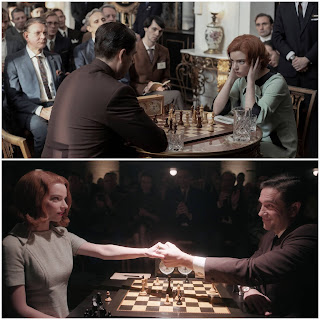When Shame Leads to Pride:
Elizabeth Harmon's greatest moment of shame and the greatest moment of pride
Lewis (2000) offers the Cognitive-Attributional Theory which explains the self-conscious emotions of embarrassment, pride, shame, and guilt. According to this model, for each one of us, there is a set of standards, rules, and goals (SRGs) that govern our behavior. Evaluation of the SRGs serves as a stimulus for self-conscious emotions to emerge. Based on this evaluation, we make a decision about success or failure of our actions, thoughts, and feelings. Additionally, we decide if this outcome is our own responsibility (internal evaluation) or if it is due to some outside circumstances/other people (external attribution). Self-attribution can be global (refers to the total self) or specific (refers to specific actions).
Based on this model, Lewis defines shame as a "consequence of a failure evaluation relative to the SRGs when the person makes a global evaluation of the self" (p. 628). While pride is a "consequence of a successful evaluation of a specific action," which includes experiencing "joy over an action, thought, or feeling well done" (p. 630).
Turner et al. (2002) note that the emotion of shame is connected to the perception of failure and is associated with individual's core values. They refer to shame as a "painful self-awareness" that is "induced by perceived failure" (p. 80). They further discuss the debilitating effects that this emotion can have on humans. "Shame is typically viewed as a highly distressful emotion that can be intensely disturbing and motivationally disruptive." "The experience of shame... is acutely painful because it involves personal, negative evaluation stemming from perceived failure relative to personal ideals, standards, riles, or goals" (p.83). However, there are strategies that can help us deal with this distressful emotion. It is important to maintain connection between present tasks and our future goals and see these tasks as instruments which can help us succeed. Individuals who have mastery and performance orientation seem to cope with shame better, although others can also learn learn how to apply these strategies.
In this post, I want to show how Elizabeth Harmon's greatest failure helped her to achieve her greatest goal, and what role the emotion of shame played in it.
***
Elizabeth Harmon's biggest goal is to beat Vasiliy Borgov, the World Champion. This would mean that she mastered the game of chess and became the best of the best. All of her victories are just steps on the way to the biggest game of her life. However, her progress gets interrupted by self-destructive episodes.
Beth constantly goes through a chain of ups and downs. Her ups are her victories over her opponents and over herself. Her downs are caused not only by her failures in chess, but also by her personal losses. She loses her mother, her best friend, her mentor, her adoptive mother, and men who she saw as her potential life partners. Her remedy is to isolate herself and go down the hole of self-destruction. She always comes back, except for this one time when she goes dangerously deep.
This period of depression starts with Beth losing her adoptive mother to a sudden illness. Her friends help her to get out of her depressive state and prepare for a game with Borgov in Paris. However, right before the game she lets herself fall in the usual trap: she spends a crazy night drinking with a new acquaintance. As a result, she comes to the match with a hangover and loses the game badly. She is devastated. Moreover, her problem with alcohol becomes public. Everyone is discussing it. On her way home, she is having the following conversation with her friend Benny :
- I'm going back to Lexington. I need to be alone.
- That is the opposite of what you need. Beth, please just come to New York. We can talk it out. You shouldn't be by yourself. You know what happens.
- Maybe that's what I want.
- What, to get drunk?
- Yeah, good and drunk.
How do we know that the feeling that Beth is experiencing is not just embarrassment? The difference between shame and embarrassment is the intensity level (Lewis, 2000). While shame appears to be an intense and disruptive emotion, embarrassment "is clearly less intense and does not involve the disruption of thought and language that shame does" (p. 631). When Beth is ashamed, she is incapable of acting logically. When losing to Borgov, she suddenly gets up and rushes out of the room without saying anything. This is a common reaction to the emotion of shame which Lewis (2000) describes as desire "to hide, disappear, or die" (p. 629). When arriving to the US, Beth locks herself in her house and avoids contact with anyone, including her best friends. She escapes in the world of alcohol and other substances which help her to forget about who she is and what happened. She basically denies her whole presence.
One day, she gets invited to a high school where a local chess tournament takes place. She barely stays on her feet when she arrives there. In the hall, she is approached by a woman. This is Annette Parker, her very first chess opponent who she played years ago. Her first real victory. Annette travelled here to thank Beth in person for the inspiration. Beth rushes out of the building and stumbles upon Beltik. He came here because he was worried about Beth. Trying to offer her some help, he is saying the following: "You need help... My dad drank... You smell just like he did. Your eyes are just like his eyes and your skin is... I am worried about you." "Sounds more like you're feeling sorry for me," - says Beth. This doesn't help. Beltik points out the truth, but he focuses on the negative side of Beth. She feels even more ashamed. So she goes back home and continues on her path to self-destruction...
One day, Jolene, her friend from the orphanage, appears suddenly by Beth's door with some news. Mr. Shaibel died. Girls go to his funeral and then to the orphanage. This is where Beth discovers that Mr. Shabel had been collecting articles about her successes for all these years... The sudden realization that she had never been alone breaks the circle of Beth going down the shame spiral. In other words, she realizes that she is not bad as a whole. Instead of being "global," shame experience becomes more "specific." Beth didn't fail as a human being, she just failed in one task. Jolene also supports Beth by accepting Beth without judging her and reminding her of who she truly is. She says: "And let's look at where you are at, which... looks like it's at the bottom of a hole. It's looking like a lot you dug yourself. My advice, stop digging." Turner et al. (2002) describe shame as "the negative evaluation" that "reflects globally on the self as an all-encompassing sense of being fundamentally flawed" (p. 83). All Beth needed is for someone to accept her for who she was and show her that she was not entirely flawed. This helped her to find inner power to stop focusing on the past and "digging the hole" and start looking in the future instead. Beth is reminded what her true goal is and gets her back on the track. With the help of her friends, she prepares for her trip to the Soviet Union to face her major opponent.
Beth plays against Borgov and triumphantly wins the game. "It's your game," says Borgov smiling and puts his defeated Queen in her hand. This is the biggest moment of pride for Elizabeth Harmon. She is the World Champion, and all of her friends are proud of her. It is Beth's mastery and also her friend's support which helped her win this time, not the pills. Thus, by the end of the series she also overcomes her addiction.
As we can see, Beth's ability to self regulate and re-establish her goals helped her to overcome her biggest failure and the debilitating shame reaction that was caused by it. She was able re-focus her attention on her biggest goal and move towards the future. This supports Turner et al.'s (2002) conclusion that long-term future goals can promote resiliency in the threat of failure and shame reaction. It is important to add that the reason why Beth could do that was because of support of people who truly cared for her. They accepted her for who she was and reminded her of what her goal was. Only with the help of others she was able to stop the "global attack on the self-system" (Lewis, 2000, p. 629) and find strength to move forward. And the feeling of pride that she experienced after her victory meant so much because it was shared with these important others who she met in the course of her life.
"Shaibel isn't the only one who kept after you all these years... For a time, I was all you had. And for a time, you was all I had. We weren't orphans. Not as long as we had each other... I'm not here to save you. I'm here because you need me to be here. That's what family does. That's what we are" (Jolene).
References
Lewis, M. (2000) Self-conscious emotions: Embarrassment, pride, Shame, and Guilt. In Lewis, M., & Haviland-Jones, J. M. (Eds.), Handbook of Emotions (2nd ed., pp. 623-636). The Guilford Press.
Turner, J. E., Husman, J., & Schallert, D. L. (2002). The importance of students' goals in their emotional experience of academic failure: Investigating the precursors and consequences of shame. Educational Psychologist, 37(2), 79-89. https://doi.org/10.1207/S15326985EP3702_3









Комментарии
Отправить комментарий